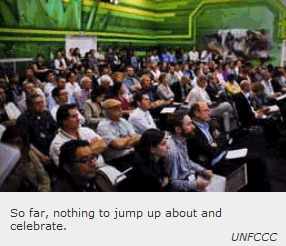|
|
|
|
|
|
|
News & Views item - December 2010 |
![]() Comments
From Cancún Week One at the 16th Annual Meeting of Members of the
United Nations Framework Convention on Climate Change Carry the Stench of Death.
(December 6, 2010)
Comments
From Cancún Week One at the 16th Annual Meeting of Members of the
United Nations Framework Convention on Climate Change Carry the Stench of Death.
(December 6, 2010)
 November
30 Japan announced it would not agree to an extension of the Kyoto
Protocol which is due to end 2012.
November
30 Japan announced it would not agree to an extension of the Kyoto
Protocol which is due to end 2012.
Ted Parson, an environmental policy expert at the University of Michigan in Ann Arbor: "It's just that the Japanese, bless their hearts, have been more honest about it than anybody else."
Elliot Diringer, vice president for international strategies at the Pew Center for Global Climate Change in Arlington told Nature that the problem is that broader questions about the legal framework of an agreement once again threaten to overshadow progress in other areas. Many developing countries want to set a deadline on negotiations over a binding commitment, but the United States and China in particular aren't ready and might not be for several years or more: "We need to accept that it's going to take time; we need to understand that the international regime is an evolutionary process," and went on to suggest that countries would be wise to set aside talk of a final treaty and instead focus on smaller agreements that would begin to put in place some of the elements of a larger accord. In short, a positive but very general declaration — committing countries to negotiate toward a binding international agreement at an unspecified date — might be preferable.
Lou Leonard, managing director of climate change for the World Wildlife Fund in Washington disagrees: "We need some decision and a mandate that says where we are going... It's really one of the open questions — how far can we get in framing the next year or two of the negotiations process? I don't think that this process in Cancún is going to get us to full clarity."
And then further damnation of faint hope.
Ted Parson says it's almost always possible to reach an agreement of some kind because of the general fear and embarrassment of failure but: "I'm actually increasingly concerned that those steps might be at best irrelevant or at worst obstructions" to the kind of action that will be required, and suggests that the best hope for real breakthroughs might be outside the United Nations process, in smaller groups of emitters like those that cobbled together the Copenhagen Accord. "Those haven't succeeded to date, but I think they have more promise for success than anything in the universal forum."
So long, and thanks for all the fish / So sad that it should come to this / We tried to warn you all, but, oh, dear / You may not share our intellect / Which might explain your disrespect / For all the natural wonders that grow around you / So long, so long, and thanks for all the fish! The world's about to be destroyed / There's no point getting all annoyed / Lie back and let the planet dissolve around you / Despite those nets of tuna fleets / We thought that most of you were sweet / Especially tiny tots and your pregnant women / So long, so long, and thanks for all the fish!/ If I had just one last wish / I would like a tasty fish!/ If we could just change one thing / We would all have learnt to sing!/ Come one and all / Man and mammal / Side by side / In life's great gene pool!/ So long, so long, and thanks for all the fish!